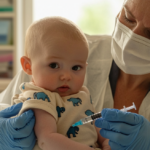 Witamina D dla dzieci na odporność/ fot. Wizualizacja stworzona za pomocą AI
Witamina D dla dzieci na odporność/ fot. Wizualizacja stworzona za pomocą AI
Witamina D dla dzieci na wzmocnienie odporności
Spis treści:
Co to jest witamina D i dlaczego jest kluczowa dla odporności dzieci?
Witamina D występuje w dwóch postaciach:
- Witamina D2 (ergokalcyferol) powstaje w organizmach roślin, drożdży i grzybów pod wpływem światła;
- Witamina D3 (cholekalcyferol) występuje w organizmach zwierzęcych i jest syntetyzowana w skórze z udziałem promieni UVB.
Witamina D bierze udział w wielu kluczowych procesach zachodzących w organizmie już od pierwszych chwil życia, takich jak:
- redukcja stanów zapalnych w organizmie,
- prawidłowa budowa naczyń krwionośnych,
- prawidłowe wydzielanie neuroprzekaźników wpływających na nastrój,
- hamowanie podziału komórek nowotworowych,
- wsparcie w procesie budowy i wzrostu kości,
- pomoc w prawidłowej pracy mięśni,
- stabilizowanie ciśnienia krwi i regulacja pracy serca,
- wspieranie dojrzewania i różnicowania się komórek odpornościowych.
Choć udowodniono, że prawidłowy poziom witaminy D w organizmie jest niezbędny dla zdrowia, w Polsce jej niedobory odnotowuje się nawet u 80% dorosłych i dzieci. Specjaliści z Polskiego Towarzystwa Endokrynologii i Diabetologii Dziecięcej wskazują, by suplementację witaminą D3 u dzieci zaczynać zaraz po narodzinach, a jej przebieg ustalać z lekarzem pediatrą w oparciu o wiek, wagę, stan zdrowia i ekspozycję dziecka na słońce.
Jak witamina D wspiera system immunologiczny dziecka?
Witamina D3 wykazuje działanie immunomodulacyjne, dzięki czemu pomaga w regulacji układu odpornościowego. Dzieje się to dzięki stymulowaniu działania fagocytów i makrofagów – komórek, które odgrywają kluczową rolę w zwalczaniu patogenów. Odpowiedni poziom witaminy D3 w organizmie dziecka to także zwiększona produkcja substancji bakteriobójczych, niezbędnych do walki z infekcjami.
Badania naukowe przeprowadzone przez badaczy z uniwersytetów w Surrey i Brighton potwierdziły, że istnieją duże różnice między wpływem na odporność witamin D3 i D2. Wynika z nich, że tylko D3 może wpływać na pracę układu odpornościowego i wzmacniać obronę przed infekcjami wirusowymi, podczas gdy witamina D2 takich korzyści nie przynosi. To istotna informacja zwłaszcza dla osób, które stosują dietę, nie uwzględniającą produktów pochodzenia zwierzęcego. Witaminę D2 możemy pozyskiwać z produktów roślinnych, np. grzybów. Jak zauważono, niektóre rodzaje żywności, np. płatki śniadaniowe czy jogurty są wzbogacane witaminą D, jest to jednak witamina D2, która nie wspiera organizmu w budowaniu odporności.
W innych badaniach potwierdzono, że witamina D wpływa na funkcję barierową nabłonka jelitowego i wzmacnia kondycję jelit, ograniczając ich przepuszczalność. Wykazano także, że prawidłowy poziom witaminy D w organizmie może zmniejszać częstotliwość występowania infekcji górnych dróg oddechowych i grypy. Co ważne, wpływ witaminy D na układ immunologiczny obserwuje się nie tylko u osób dorosłych, ale i u dzieci, które szczególnie często zapadają na choroby górnych dróg oddechowych. W czasie pandemii dowiedziono również, że suplementacja witaminy D może zmniejszać ryzyko wystąpienia ostrej infekcji dróg oddechowych, w tym COVID.
Zalecane dawki witaminy D dla dzieci w różnym wieku
Witamina D dla noworodka i niemowlaka do 6. miesiąca życia
U noworodków donoszonych i wcześniaków urodzonych w 33.-36. tygodniu ciąży, a także niemowląt do 6. miesiąca życia zalecana dawka witaminy D wynosi 400 j.m. na dobę. Jeśli dziecko jest karmione mieszanką mleczną wzbogaconą o witaminy, dawki podawanej dodatkowo witaminy D3 dla noworodka powinny to uwzględniać.
Witamina D u niemowląt powyżej 6. miesiąca życia a także dzieci w wieku od 1 do 10 lat
Niemowlęta od 6. do 12. miesiąca życia powinny otrzymywać od 400-600 j.m. na dobę. W ich przypadku także trzeba wziąć pod uwagę skalę suplementacji w posiłkach. Po ukończeniu 1. roku i w kolejnych latach, do 10. roku życia dziecka dawka dobowa witaminy D3 powinna wynosić 600-1000 j.m.
Dawkowanie D3 u nastolatków i młodzieży
W przypadku dzieci od 11. do 18. roku życia dawka powinna wynosić 800-2000 j.m. na dobę, oczywiście w zależności od masy ciała i składu diety. U nastolatków z nadwagą i otyłością dawka dobowa powinna być dwa razy wyższa.
Sygnały niedoboru witaminy D u dzieci i ich wpływ na odporność
Niedobór witaminy D3 u dzieci jest szczególnie groźny, ponieważ może mieć wpływ na ich prawidłowy rozwój i spowodować:
- zaburzenia w budowie szkieletu i zębów;
- zmniejszenie gęstości kości;
- krzywicę;
- osłabienie odporności;
- zaburzenia rozwoju umysłowego;
- występowanie chorób dietozależnych;
- zaburzenia neuropsychiatryczne.
Jakie objawy niedoboru witaminy D3 można zaobserwować u dziecka? Najważniejsze z nich, to:
- zmęczenie i osłabienie mięśni,
- bóle kości i stawów,
- wypadanie włosów,
- kłopoty z zasypianiem,
- zaburzona koncentracja,
- pogorszenie nastroju.
Istotnym objawem deficytu witaminy D3 w organizmie może być także zwiększona zapadalność na infekcje, choroby autoimmunologiczne i problemy sercowo-naczyniowe. Dzieci nie są też niestety wolne od zagrożenia opornością na insulinę, występowania procesów zapalnych w organizmie czy zaburzeń w gospodarce wapniowej prowadzących do osteoporozy.
Naturalne źródła witaminy D w diecie dziecka
Dieta bogata w witaminę D powinna uwzględniać:
- tłuste ryby morskie (węgorz, łosoś, dorsz, śledź, makrela),
- jaja, zwłaszcza żółtka,
- krowie mleko,
- masło,
- sery żółte.
Naturalnym źródłem witaminy D jest światło słoneczne. Niestety w naszych warunkach geograficznych możemy cieszyć się nim tylko od marca do września. By zapewnić sobie odpowiednią dawkę witaminy powinno się poddać działaniu słońca (bez stosowania filtrów) ok. 18% proc. ciała (odkryta głowa i przedramiona) przez 30-45 minut w godzinach między 10.00 a 15.00.

Suplementacja witaminą D – kiedy jest konieczna dla wzmacniania odporności?
Witamina D3 wpływa stymulująco na układ immunologiczny, wspomagając go zarówno w infekcjach bakteryjnych, jak i wirusowych. Wraz z jej niedoborem dzieci mogą częściej chorować, głównie na infekcje dróg oddechowych. Warto jednak pamiętać, że budowanie odporności nie powinno być jednorazową akcją, np. przed zbliżającą się jesienią i zimą, ale procesem trwającym nieustannie. Wiele niedoborów uregulujemy odpowiednio skomponowaną dietą o stosownej do wieku i kondycji dziecka kaloryczności. Równie ważne będą jednak także inne czynniki wpływające na odporność:
- aktywność fizyczna,
- odpowiednia ilość snu i relaksu,
- redukowanie stresu.
Dopełnienie tych codziennych warunków suplementacją stworzy solidny system chroniący przed infekcjami.
Warto też pamiętać, że system odpornościowy u dzieci rozwija się i kształtuje od pierwszych chwil życia do ok. 12. roku życia. Jak więc widać, jednorazowe akcje wzmacniające odporność raczej nie przyniosą sukcesu.
Jak bezpiecznie podawać dziecku witaminę D?
O witaminie D w ostatnich latach mówi się bardzo dużo, zwłaszcza w kontekście jej niedoborów i wpływu na rozwój i dobrostan ludzi. Odpowiedzią na zainteresowanie jest duża liczba wiarygodnych badań potwierdzających oddziaływanie witaminy D i skutki deficytów.
W sprzedaży jest wiele preparatów zawierających witaminę D dostosowanych do różnych potrzeb. Znajdziemy krople, spraye, wyciskane kapsułki, tabletki do ssania, wreszcie klasyczne tabletki. Także ilość substancji czynnej w preparatach jest różna. Zarówno wysokość dawki, jak i sposób dawkowania preparatu u dzieci powinno się skonsultować z lekarzem.
Rodzice maluchów mają wiele wątpliwości, jaka jest bezpieczna suplementacja witaminy D. Oto kilka zasad, o których warto pamiętać:
- Witamina D nie rozpuszcza się w wodzie, by dobrze się wchłaniała, powinno się ją przyjmować podczas posiłku uwzględniającego tłuszcz, najlepiej zwierzęcy.
- Należy wystrzegać się łączenia jej z produktami obniżającymi jej przyswajalność m. in. produktami wysokobłonnikowymi (płatki owsiane, otręby).
- Niektóre kapsułki z witaminą D mają w swoim składzie oleje roślinne (kapsułki), które poprawiają jej przyswajalność. Wówczas można stosować je niezależnie od posiłku.
- Jeśli zażywamy witaminę D3, suplementy wapnia i magnezu, powinniśmy nie łączyć ich razem, ale zachować trzygodzinny odstęp.
- Wchłanianie witaminy D3 obniżają wysokie dawki witaminy A oraz witamina E.
- Nigdy nie powinno się podawać dziecku dawki D3 „na oko” – należy uważnie wyciskać preparat z fiolki i dozować krople.
- Nie należy stosować witaminy D3 z lekami zobojętniającymi sok żołądkowy, które zawierają magnez.
Źródła:
- Jarosz M. i in., Normy żywienia dla populacji polskiej i ich zastosowanie, Narodowy Instytut Zdrowia Publicznego – Państwowy Zakład Higieny, 2020.
- Karmańska A., Witamina D – gospodarka wapniowa, w: Wielokierunkowe działanie witaminy D, Wydawnictwo Uniwersytetu Medycznego w Łodzi, Łódź 2021, s. 16-20.
- Louise R. Durrant i in., Vitamins D2 and D3 Have Overlapping But Different Effects on the Human Immune System Revealed Through Analysis of the Blood Transcriptome, Front. Immunol., Volume 13 – 2022 | https://doi.org/10.3389/fimmu.2022.790444
- Rusińska A. i in., Zasady suplementacji i leczenia witaminą D – nowelizacja 2018 r. Post Neonatol. 2018;24(1).
- Sajkowska-Kozielewicz J.J., Paradowska K., Witamina D – składnik o wielostronnym działaniu, Herbalism, 2016, 1 (2), s. 35–58.
- Walczyk J., Wytyczne suplementacji witaminy D – skrót aktualnych zaleceń, https://diabetologia.mp.pl/wytyczne/92799,wytyczne-suplementacji-witaminy-d-skrot-aktualnych-zalecen, [dostęp: 18.09.2024 r.].
- Wierzejska R., Witamina D a COVID-19. Aktualny stan wiedzy, Narodowe Centrum Edukacji Żywieniowej, https://ncez.pzh.gov.pl/abc-zywienia/witamina-d-a-covid-19-aktualny-stan-wiedzy/ [dostęp: 18.09.2024 r.].










































